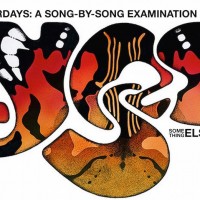Yes’ 13th album has a special place in the band’s lore. In fact, Union may well be their 14th album as Jon Anderson, Bill Bruford, Rick Wakeman and Steve Howe produced Anderson Bruford Wakeman Howe after Anderson’s departure from Yes at the end of the Big Generator tour.
The nine ABWH songs on Union were to be included on a follow-up project from Anderson Bruford Wakeman Howe. These basic tracks were recorded in Correns, France with producer Jonathan Elias, then were completed after a shift to LA in the wake of negative early feedback from Anderson Bruford Wakeman Howe’s label. Meanwhile, Yes was reduced to only Chris Squire, Alan White, Tony Kaye and Trevor Rabin. They continued to record and collaborate elsewhere in Los Angeles, and even initially flirted with guitarist-vocalist Billy Sherwood and Roger Hodgson of Supertramp fame.
At a stand still, the two camps suddenly merged. Anderson added his vocals to all of the Anderson Bruford Wakeman Howe songs, and Chris Squire did the same on two. Since the ABWH tracks were basically completed when Squire became involved, however, Tony Levin’s original parts remained on Union – marking the first time Squire wasn’t the sole featured bassist on a Yes album.
How’d this pieced-together new Yes project happen? Label and management pressure. The separate groups of musicians actually never played together in the studio, or developed songs with one another. Union was obviously poorer for it.
They got underway with “I Would Have Waited Forever,” an intriguing opener written by Jon Anderson, Steve Howe and producer Jonathan Elias. This ABWH song features a guitar riff that Howe had laying around; it was then worked up by Anderson and Elias into the song. Howe would later employ the same riff on the song “Sensitive Chaos” from his excellent solo album Turbulence.
Elias’ production lends a modern touch to the progressive elements, yet something is missing. The reason: That main guitar riff may have been written by Howe, but it’s actually played by Jimmy Haun, who was asked by Elias to rerecord a number of Howe parts which were deemed unsuitable for the album. Howe added the end solo, but most of the rest ended up in the ether.
Additionally, the keyboards are disappointingly bland. It’s doubtful Wakeman played a lick on the released version of the song, as his contributions were erased in favor of a combination of the 11 other keyboardist and programmers used on the Anderson Bruford Wakeman Howe tracks – or replaced by Elias himself. Elsewhere, Bill Bruford adds effective and unobtrusive electronic drumming, complementing Tony Levin’s restrained Chapman Stick playing. A high point of the song is the Anderson/Squire vocal blend, but even that is compromised by additional background singers.
Released as this album’s third single, “I Would Have Waited Forever” isn’t an unpleasant song. It’s just one of the least “Yes” sounding singles in their canon, as a reformulated lineup tries too hard to create a magic which simply wasn’t there.


